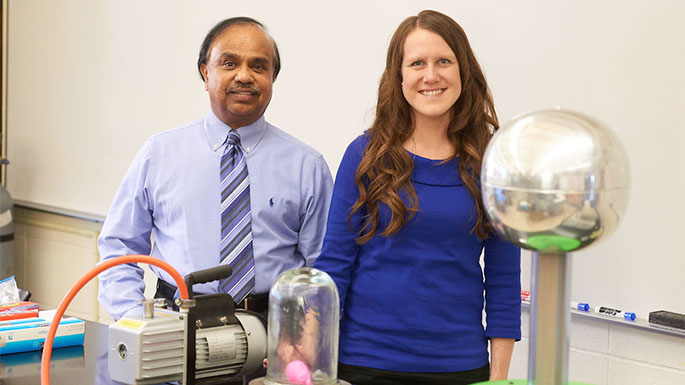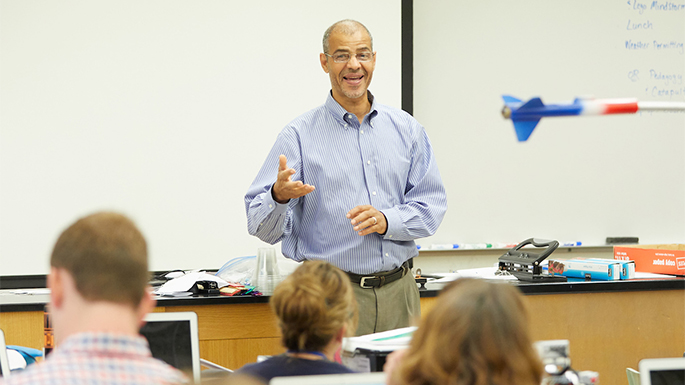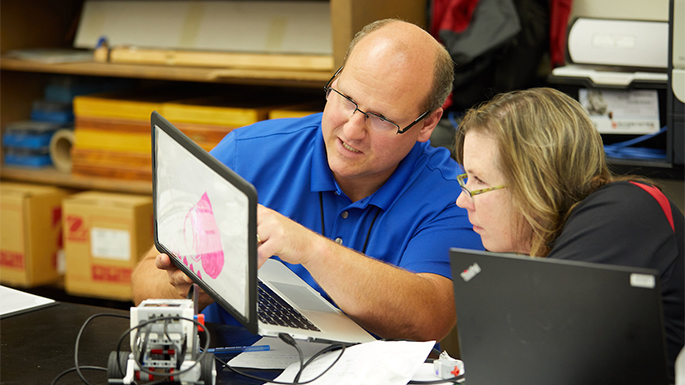Posted p.m. Friday, June 23, 2017

K-12 teachers program Lego robots — one of many teaching tools shared during UWL training.
K-12 teachers program Lego robots — one of many teaching tools shared during UWL training
Melanie Bawek’s robot spun its wheels across the floor of a UW-La Crosse classroom on Thursday. Programmed to draw a circle on paper, the gadget redirected a marker point with each turn she had programmed into its computer brain. She smiled thinking of the reception the Lego MINDSTORMS Education EV3 robot would get in her eighth grade science class. “When you think of Legos, you think of a toy,” says the teacher from Gale-Ettrick-Trempealeau Middle School. “We are now turning Legos into tools for education, which is super engaging for kids of all grade levels.” Getting kids engaged in science and ultimately improving student achievement in math and science in the state is the goal of a series of workshop for K-12 teachers currently underway at UWL called the “iTEAMS” project. During the workshops, nearly 40 fourth-grade through 12th-grade teachers from 12 area school districts are learning how to integrate technology, engineering, arts and mathematics with science. Jennifer Docktor and Gubbi Sudhakaran, in UWL’s Physics Department, earned a nearly $441,000 grant from the U.S. Department of Education Mathematics and Science Partnerships Program and the Wisconsin Department of Public Instruction to run workshops over a two-year period. The first workshops were offered this March-June. [caption id="attachment_49190" align="aligncenter" width="685"] Gubbi Sudhakaran and Jennifer Docktor, UWL Physics, earned a two-year grant that will help K-12 teachers improve student achievement in Wisconsin. In addition to teaching in the Physics Department, Docktor teaches “Teaching and Learning Science in the Secondary School,” a class for future biology, chemistry and physics teachers.[/caption]
Docktor says the benefits are mutual when universities form partnerships with local school districts. K-12 teachers gain new skills, confidence, ideas and networks for teaching. Higher education faculty gain more awareness of how subjects are taught at the K-12 level, as well as the challenges. That gives Docktor new ideas to improve her UWL courses for future science teachers.
Higher education faculty from UWL, Winona State University and Western Technical College helped with the teacher training, along with CESA 4, one of the 12 nonprofit Cooperative Educational Service Agencies that serves educational needs in Wisconsin.
Connecting higher education faculty to K-12 teachers makes sense because faculty are experts in their field, and they think with a problem-solving mentality that is important to pass on to young people to get them excited about science, says Abdallah Bendada, educator effectiveness/paraprofessional coordinator for the Wisconsin Department of Public Instruction.
[caption id="attachment_49193" align="aligncenter" width="685"]
Gubbi Sudhakaran and Jennifer Docktor, UWL Physics, earned a two-year grant that will help K-12 teachers improve student achievement in Wisconsin. In addition to teaching in the Physics Department, Docktor teaches “Teaching and Learning Science in the Secondary School,” a class for future biology, chemistry and physics teachers.[/caption]
Docktor says the benefits are mutual when universities form partnerships with local school districts. K-12 teachers gain new skills, confidence, ideas and networks for teaching. Higher education faculty gain more awareness of how subjects are taught at the K-12 level, as well as the challenges. That gives Docktor new ideas to improve her UWL courses for future science teachers.
Higher education faculty from UWL, Winona State University and Western Technical College helped with the teacher training, along with CESA 4, one of the 12 nonprofit Cooperative Educational Service Agencies that serves educational needs in Wisconsin.
Connecting higher education faculty to K-12 teachers makes sense because faculty are experts in their field, and they think with a problem-solving mentality that is important to pass on to young people to get them excited about science, says Abdallah Bendada, educator effectiveness/paraprofessional coordinator for the Wisconsin Department of Public Instruction.
[caption id="attachment_49193" align="aligncenter" width="685"] Abdallah Bendada,educator effectiveness/paraprofessional coordinator for the Wisconsin Department of Public Instruction, greets teachers during the Thursday workshop.[/caption]
The ability to problem solve is one of the core skills employers are constantly looking for in UWL graduates, says Mark Sandheinrich, interim dean of the UWL College of Science and Health. The workshop encourages K-12 teachers to build those problem solving skills in students, as well as other core skills employers look for including: teamwork, communication, creativity and critical thinking, says Sandheinrich. If high school students come to college with these skills already ingrained, universities can begin building on that foundation instead of spending extra time and tuition dollars teaching these core areas, he adds.
Bendada says teachers — particularly from smaller schools — sometimes don’t have a teacher in the classroom next door to go to for collaboration or inspiration. The workshop provides that.
Tim Sprain, a seventh grade teacher at La Crosse’s Lincoln Middle School, says he’ll use ideas from the workshop in his science classes. But, as district director of the Wisconsin Society of Science Teachers (WSST), he plans to share what he has learned from the “absolutely exceptional” experience with the region.
On Tuesday he developed a lesson using the robot that integrates engineering topics into his current science curriculum. He plans to share it with teachers across multiple disciplines from art to math to science across several schools and grade levels, including Lincoln Middle School. While art students could use the robot to create shapes, science students could program it to collect water or soil samples for monitoring. The same physics concepts could be applied by students in theater helping to develop a pulley system to fly an object onto a set.
[caption id="attachment_49194" align="aligncenter" width="685"]
Abdallah Bendada,educator effectiveness/paraprofessional coordinator for the Wisconsin Department of Public Instruction, greets teachers during the Thursday workshop.[/caption]
The ability to problem solve is one of the core skills employers are constantly looking for in UWL graduates, says Mark Sandheinrich, interim dean of the UWL College of Science and Health. The workshop encourages K-12 teachers to build those problem solving skills in students, as well as other core skills employers look for including: teamwork, communication, creativity and critical thinking, says Sandheinrich. If high school students come to college with these skills already ingrained, universities can begin building on that foundation instead of spending extra time and tuition dollars teaching these core areas, he adds.
Bendada says teachers — particularly from smaller schools — sometimes don’t have a teacher in the classroom next door to go to for collaboration or inspiration. The workshop provides that.
Tim Sprain, a seventh grade teacher at La Crosse’s Lincoln Middle School, says he’ll use ideas from the workshop in his science classes. But, as district director of the Wisconsin Society of Science Teachers (WSST), he plans to share what he has learned from the “absolutely exceptional” experience with the region.
On Tuesday he developed a lesson using the robot that integrates engineering topics into his current science curriculum. He plans to share it with teachers across multiple disciplines from art to math to science across several schools and grade levels, including Lincoln Middle School. While art students could use the robot to create shapes, science students could program it to collect water or soil samples for monitoring. The same physics concepts could be applied by students in theater helping to develop a pulley system to fly an object onto a set.
[caption id="attachment_49194" align="aligncenter" width="685"] Tim Sprain, a seventh grade teacher at La Crosse’s Lincoln Middle School, is also a graduate faculty facilitator for UWL’s Professional Studies in Education. He plans to share what he learned at the workshop with teachers across disciplines and grade levels.[/caption]
Sprain wants to make sure teachers know about the exceptional resources available to them through opportunities like the UWL iTEAMS workshop. Teachers sharing knowledge with each other is key, he says.
Bawek and Lindsay Johnson, who teaches fourth grade at Arcadia Elementary School, already had a collaborative teaching idea in mind using the EV3 robot.
A fourth grade student could learn to program the robot to make a shape and then take it to an elementary school classroom where kids are learning geometrical concepts. While students would be preparing for future careers programming computer technology, they would also be learning some of those core foundational skills in communication, teamwork, critical thinking and problem solving that employers will ultimately need.
Bawek is grateful for the workshop that has connected her with other K-12 teachers and those from higher education. It allows them to brainstorm the best ways to prepare the next generation of students together.
Tim Sprain, a seventh grade teacher at La Crosse’s Lincoln Middle School, is also a graduate faculty facilitator for UWL’s Professional Studies in Education. He plans to share what he learned at the workshop with teachers across disciplines and grade levels.[/caption]
Sprain wants to make sure teachers know about the exceptional resources available to them through opportunities like the UWL iTEAMS workshop. Teachers sharing knowledge with each other is key, he says.
Bawek and Lindsay Johnson, who teaches fourth grade at Arcadia Elementary School, already had a collaborative teaching idea in mind using the EV3 robot.
A fourth grade student could learn to program the robot to make a shape and then take it to an elementary school classroom where kids are learning geometrical concepts. While students would be preparing for future careers programming computer technology, they would also be learning some of those core foundational skills in communication, teamwork, critical thinking and problem solving that employers will ultimately need.
Bawek is grateful for the workshop that has connected her with other K-12 teachers and those from higher education. It allows them to brainstorm the best ways to prepare the next generation of students together.